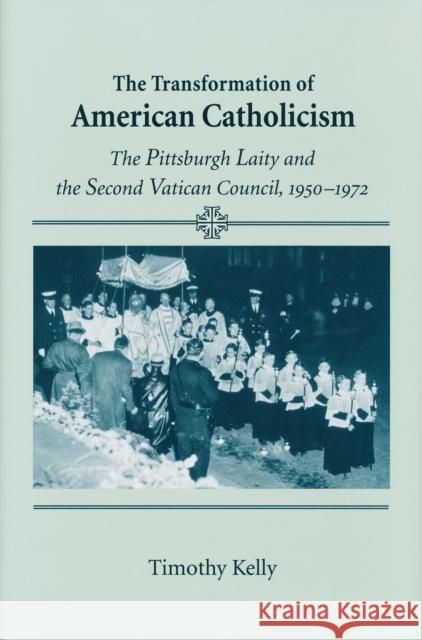Transformation of American Catholicism: The Pittsburgh Laity and the Second Vatican Council, 1950-1972 » książka
Transformation of American Catholicism: The Pittsburgh Laity and the Second Vatican Council, 1950-1972
ISBN-13: 9780268033194 / Angielski / Twarda / 2009 / 376 str.
Most scholars and media analysts have suggested that Vatican II revolutionized American Catholicism, with the changes it mandated filtering down from the Council to the church hierarchy to the laity.Timothy Kelly's book challenges this assumption, based on his careful tracing of Catholic lay practices in the Pittsburgh Diocese from the 1950s through the 1970s. The lay experience of American Catholics did change dramatically in the 1960s, but Kelly argues that the transformation began earlier, before the Council, and continued throughout the next decade. Kelly examines the discourse of Catholicism in the 1950s and compares this to actual lay behavior. He discusses critical changes introduced by Vatican II and follows the lay response for a decade after the last Council sessions to illuminate Catholic efforts to implement the changes in everyday practice. His individual chapters focus on devotional behavior, liturgical reforms, and broader social and cultural issues.Kelly's social history reveals that Vatican II was not a shock to a complaisant and unquestioning laity as much as a reform necessary to keep pace with changing religious, social, and cultural sensibilities. As Catholics rejected a heavily devotional religiosity, they sought instead practices that resonated more with their lived experiences. An emphasis on social justice grew, but lay Catholics had not yet charted a clear path by the end of the Council's last session, and by that time, church officials had begun to resist some of the Vatican II reforms. A fascinating study of the most profound transformation in American Catholicism in the last century, Kelly's work is an important contribution to Catholic history."Timothy Kelly's well-grounded case study, featuring exceptionally detailed research enlivened by vigorous narrative, is a provocative and valuable contribution to the literature on twentieth-century U.S. Catholicism." James Fisher, Fordham University Finally, a book that looks at how real Catholics negotiated the societal and religious changes of the fifties and sixties. Kelly has accomplished the hard task of assembling a social history of a people in transition. His painstakingly careful research is particularly sensitive to how Catholics dealt with the changing status of women and the racial geography of Pittsburgh. From the bottom up we see how American Catholics were reworking their religion long before the advent of the Second Vatican Council. Colleen McDannell, Professor and Sterling M. McMurrin Professor of Religious Studies, University of Utah Case studies of the rich history of American Catholicism have already advanced our knowledge of the interactions between religion and social experience. Timothy Kelly's imaginative exploration ofPittsburgh's involvement in the transformations of modern Catholicism shoots right to the top of the list, in showing the complex linkages among laity, clergy, and the larger Church in causing and processing change. Peter N. Stearns, Provost, George Mason University"











